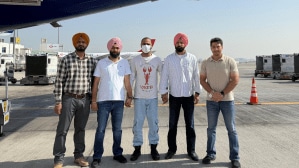Village by the mall
FOR the 70,000 villagers living in the 70 villages that make up the Warnanagar Co-operative in the prosperous sugar bowl of Kolhapur distric...

FOR the 70,000 villagers living in the 70 villages that make up the Warnanagar Co-operative in the prosperous sugar bowl of Kolhapur district, supermarkets and computers are old news. These villages have been living in the fast lane since the mid-1970s.
At a time when supermarkets were unheard of even in urban India, the National Consumer Co-operative Federation under the Central Food and Supplies Ministry chose Warnanagar to float the supermarket concept in 1975. And in 1996 when the Wired Village concept was an unfamiliar word in Maharashtra, it was Warnanagar that spearheaded the connectivity technology movement. The result: 70 information kiosks in each village.
When the 10,000 sq feet modern shopping arcade sprouted at Warnanagar more than 25 years ago, women with babies would peep in timidly. It took a lot of persuasion to get them in and show them how to shop with trolleys. Now about 32 supermarkets called Warana Bazaar dot the Warnanagar area. 32,000 villagers shop here every day ensuring a business of Rs 15 lakh a day.
This consumer co-operative with a Rs 50 crore turnover annually, has also provided job opportunities to local women who form the major workforce in the sales and packing units. A four week certificate course in consumer co-operative from the Shivaji University of Kolhapur is also conducted in Warnanagar.
Says Prabhatai Kore, chairperson of Warana Bazaar and the daughter-in-law of the pioneer of this movement, late Tatyasaheb Kore: ‘‘When my father-in-law visited Japan in 1963, he was enamoured by the supermarkets. So, when the central government chose Warnanagar for this experiment, Tatyasaheb welcomed it.’’
Says Sharad Mahajan, general manager of Warana Bazaar, who’s been here since its inception: ‘‘We made the villagers feel at home, won their hearts and they whole-heartedly accepted this concept. Today, we have 10,000 members who are shareholders and get 30 per cent dividend in the form of discount schemes.’’
The supermarkets have changed the lifestyle of the villagers. For instance, earlier, no one would buy kabuli chana or rajma since it was not their traditional food. But now they are very popular. Every new article is tried out enthusiastically. The tradition of stocking up grains and pulses for the whole year is also going down.
Says Vijaya Patil, a resident of Bhairewadi, about three kilometres from Warnanagar: ‘‘Earlier if we had to buy good quality grocery, utensils or even clothes, we had to visit Kolhapur, a good 30 kms away. Now, with the Warana Bazaar being so self-sufficient, I am very satisfied. I don’t have to depend on my husband or son to take me to Kolhapur. Even the best sarees are available here and they are cheaper too.’’
A couple of years ago Warana Bazaar had even begun a home delivery service but it flopped because the women didn’t want it. Visiting the bazaar was such an enjoyable outing for them that they didn’t want to give it up.
Modernisation has made the villagers life easy in more ways than one. Janhavi Jadhav, a resident of Talsande village about four kms from Warnanagar, who sells milk to the Warnanagar Dairy co-operative, is a case in point. Earlier she had to stand in endless queues to get the milk manually weighed by co-operative employees. ‘‘Now the computer has made it very easy. I take just three to five minutes at the counter and I can go back home quickly.’’
Out of the 600 collection centres, 60 of them have been computerised and others are to follow. Payment to each vendor is made online and every ten days the vendor can check his bank account.
The information kiosks in the villages too have improved the lot of the farmer. With sugarcane being the major crop produce here, small time farmers had to make frequent trips to the Warnanagar Sugar Co-operative to check the weight of their sugarcane and then for payment. Information kiosks have changed all that.
Says Jaganath Khot who owns a five acre sugarcane farm: ‘‘When my bullock cart reaches the sugar co-operative, it is given a code number which is fed into the computer and I have to just login to find out the weight of the sugarcane supplied to it. Similarly, I can check the position of my final payment status, after deduction of my loans.’’
And Warnanagar is not stopping at this. Its next step is towards e-governance at the tehsil level.






- 01
- 02
- 03
- 04
- 05

























